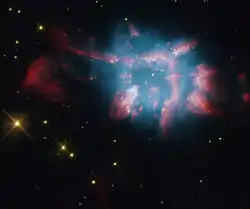| Emission nebula | |
|---|---|
| Planetary nebula | |
 NGC 6326 as seen through the Hubble Space Telescope | |
| Observation data: J2000 epoch | |
| Right ascension | 17h 20m 46.3s |
| Declination | −51° 45′ 16″ |
| Apparent magnitude (V) | 12.2 |
| Apparent dimensions (V) | 0.32′[1] |
| Constellation | Ara |
| Physical characteristics | |
| Radius | 0.5 ly |
| Designations | PK 338-8.1, ESO 228-PN1, AM 1716-514 and CS=13.5 |
NGC 6326 is a complex and irregularly structured planetary nebula located in the constellation Ara. It was discovered by Scottish astronomer James Dunlop on 26 August 1826. NGC 6326 is the result of the ejected material from the central binary star, which is nearing the end of its life. The blue and red color is due to the amount of radiation the star releases, thus causing the gasses to glow. NGC 6326 is located at about 11,000 light years away from Earth.[1][2][3][4]
See also
References
- 1 2 "Object No. 1 - NGC 6326". NASA/IPAC extragalactic database. NASA/IPAC. Retrieved 4 October 2015.
- ↑ "Revised NGC Data for NGC 6326". Seds. Retrieved 4 October 2015.
- ↑ "NGC 6326". Cseligman. Retrieved 4 October 2015.
- ↑ "Object: NGC 6626 - Planetary Nebula in Ara". Waid-observatory. Retrieved 4 October 2015.
External links
 Media related to NGC 6326 at Wikimedia Commons
Media related to NGC 6326 at Wikimedia Commons
This article is issued from Wikipedia. The text is licensed under Creative Commons - Attribution - Sharealike. Additional terms may apply for the media files.